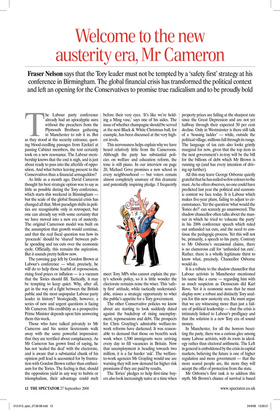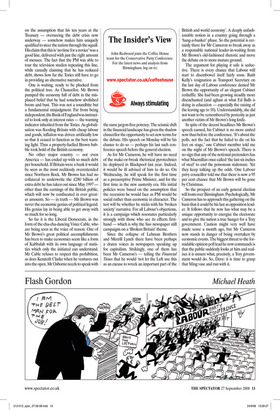Welcome to the new austerity era, Mr Cameron
Fraser Nelson says that the Tory leader must not be tempted by a ‘safety first’ strategy at his conference in Birmingham. The global financial crisis has transformed the political context and left an opening for the Conservatives to promise true radicalism and to be proudly bold The Labour party conference already had an apocalyptic aura without the preachers from the Plymouth Brethren gathering in Manchester to rub it in. But as they stood at the security entrance, quoting blood-curdling passages from Ezekiel at passing Cabinet members, the text certainly took on a new resonance. The Labour membership knows that the end is nigh, and is just about ready to pass into the afterlife of opposition. And what better leaving present to the Conservatives than a financial armageddon?
As little as a month ago, David Cameron thought his best strategic option was to say as little as possible during the Tory conference, which starts this weekend in Birmingham — but the scale of the global financial crisis has changed all that. Most paradigm shifts in politics are recognisable only in retrospect, but one can already say with some certainty that we have moved into a new era of austerity. The original Cameroon model was built on the assumption that growth would continue, and that the real fiscal question was how its ‘proceeds’ should be ‘shared’ between public spending and tax cuts over the economic cycle. Officially, this remains the aspiration. But it sounds pretty hollow now.
The yawning gap left by Gordon Brown at Labour’s conference — what, precisely, he will do to help those fearful of repossession, rising food prices or inflation — is a vacuum that the Tories should fill. Tactically, it may be tempting to keep quiet. Why, after all, get in the way of a fight between the British public and the most unpopular Labour party leader in history? Strategically, however, a series of new and urgent questions is facing Mr Cameron. His credibility as a prospective Prime Minister depends upon him answering them this week.
Those who have talked privately to Mr Cameron and his senior lieutenants walk away with the same powerful impression: that they are terrified about complacency. As Mr Cameron has grown fond of saying, he has not ‘sealed the deal’ with the electorate, and is aware that a substantial chunk of his opinion poll lead is accounted for by frustration with Gordon Brown rather than enthusiasm for the Tories. The feeling is that, should the opposition yield in any way to hubris or triumphalism, their advantage could melt before their very eyes. ‘It’s like we’re holding a Ming vase,’ says one of his aides. The issue of whether champagne should be served at the next Black & White Christmas ball, for example, has been discussed at the very highest levels.
This nervousness helps explain why we have heard relatively little from the Cameroons. Although the party has substantial policies on welfare and education reform, the tone is still piano. In our interview on page 20, Michael Gove promises a new school in every neighbourhood — but voters remain almost completely unaware of this dramatic and potentially inspiring pledge. I frequently meet Tory MPs who cannot explain the party’s schools policy, so it is little wonder the electorate remains none the wiser. This ‘safety first’ attitude, while tactically understandable, misses a strategic opportunity to whet the public’s appetite for a Tory government.
The other Conservative policies we know about are starting to look suddenly dated against the backdrop of rising unemployment, repossessions and debt. The prospects for Chris Grayling’s admirable welfare-towork reforms have darkened. It was reasonable to demand that those on benefits seek work when 1,500 immigrants were arriving every day to fill vacancies in Britain. Now that unemployment is heading towards two million, it is a far harder ‘ask’. The welfareto-work agencies Mr Grayling would use are warning they will now demand far higher risk premiums if they are paid by results.
The Tories’ pledges to help first-time buyers also look increasingly naive at a time when property prices are falling at the sharpest rate since the Great Depression and are not yet halfway through their expected 30 per cent decline. Only in Westminster is there still talk of a ‘housing ladder’ — while, outside the political village, millions fall through its rungs. The language of tax cuts also looks grimly marginal for now, given that the top item in the next government’s in-tray will be the bill for the billions of debt which Mr Brown is running up (and has every intention of driving up further).
All this may leave George Osborne quietly grateful that he has nailed so few colours to the mast. As he often observes, no one could have predicted last year the political and economic context we face today. It is Labour which makes five-year plans, failing to adjust to circumstances. Yet the question ‘what would the Tories do?’ can scarcely go unanswered. The shadow chancellor often talks about the manner in which he tried to ‘educate the party’ in his 2006 conference speech which ruled out unfunded tax cuts, and the need to continue the pedagogic process. Yet this will not be, primarily, a speech to his party. Contrary to Mr Osborne’s occasional claims, there is no clamorous call for ‘unfunded tax cuts’. Rather, there is a wholly legitimate thirst to know what, precisely, Chancellor Osborne would do.
It is a tribute to the shadow chancellor that Labour activists in Manchester mentioned his name like a curse — regarding him with as much suspicion as Democrats did Karl Rove. Yet it is economic nous that he must display now: a robust and distinctly Tory analysis for this new austerity era. He must argue that we are witnessing more than just a failure of political leadership — that the crisis is intimately linked to Labour’s profligacy and that the solution is a new Tory era of sound money.
In Manchester, for all the horrors besetting the party, there was a curious glee among many Labour activists, with its roots in ideology rather than electoral arithmetic. The Left in general is emboldened by the crisis in capital markets, believing the future is one of higher regulation and more government — that the more scared people are, the more they will accept the offer of protection from the state.
Mr Osborne’s first task is to address this myth. Mr Brown’s chance of survival is based on the assumption that his ten years at the Treasury — overseeing the debt crisis now underway — somehow makes him uniquely qualified to steer the nation through the squall. His claim that this is ‘no time for a novice’ was a good line, delivered with just the right amount of menace. The fact that the PM was able to tour the television studios repeating this line, while casually claiming that he has reduced debt, shows how far the Tories still have to go in providing an alternative narrative.
One is waiting, ready to be plucked from the political tree. As Chancellor, Mr Brown pumped the economy full of debt in the misplaced belief that he had somehow abolished boom and bust. This was not a soundbite but a fundamental misjudgment. Far from being independent, the Bank of England was instructed to look only at interest rates — the warning indicator inherited from the Tories. As globalisation was flooding Britain with cheap labour and goods, inflation was driven artificially low so that it ceased to function as the best warning light. Thus a property-fuelled Brown bubble took hold of the British economy.
No other major country — not even America — has ended up with so much debt per household. If Britain were a bank it would be seen as the most recklessly overextended since Northern Rock. Mr Brown has had no collateral to underwrite the £280 billion of extra debt he has taken out since May 1997 — other than the earnings of the British public, which will now be confiscated in ever greater amounts. So — in truth — Mr Brown was never the economic genius of political legend. His genius lay in being able to get away with so much for so long.
So far it is the Liberal Democrats, in the form of the cha-cha-dancing Vince Cable, who are being seen as the voice of reason. One of Mr Brown’s great political accomplishments has been to make economics seem like a form of Kabbalah with its own language of statistics which only the initiated can understand. Mr Cable refuses to respect this prohibition, as does Kenneth Clarke when he ventures out into the open. Mr Osborne needs to speak with











































































 Previous page
Previous page